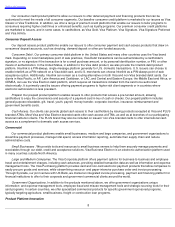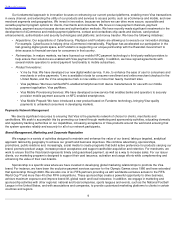Visa 2012 Annual Report Download - page 20
Download and view the complete annual report
Please find page 20 of the 2012 Visa annual report below. You can navigate through the pages in the report by either clicking on the pages listed below, or by using the keyword search tool below to find specific information within the annual report.
Table of Contents
Regulation of the payments industry has increased significantly in recent years. Complying with these and other regulations
increases our costs and can reduce our revenue opportunities. Similarly, the impact of such regulations on our clients may reduce
the volume of payments we process. Moreover, such regulations can limit the types of products and services that we offer, the
countries in which our cards are used and the types of cardholders and merchants who can obtain or accept our cards. Any of
these occurrences can materially and adversely affect our business, prospects for future growth, financial condition and results of
operations.
Examples include:
Litigation Risks
Our retrospective responsibility plan may not adequately insulate us from the impact of settlements or final judgments.
Our retrospective responsibility plan addresses monetary liabilities from settlements of, or final judgments in, the covered
litigation, which is described in Note 3—Retrospective Responsibility Plan to our consolidated financial statements included in
Item 8 of this report. The retrospective responsibility plan consists of several related mechanisms to fund settlements or judgments
in the covered litigation. These include an escrow account funded with a portion of the net proceeds of our initial public offering and
potential subsequent offerings of our shares of class A common stock (or deposits of cash into the escrow account in lieu of such
offerings). They also include a loss sharing agreement and a judgment sharing agreement. In addition, our U.S. members are
obligated to indemnify us pursuant to Visa U.S.A.'s certificate of incorporation and bylaws and in accordance with their membership
agreements. These mechanisms are unique, complicated, and tiered, and if we cannot use one or
18
• Data Protection and Information Security . Aspects of our operations and business are subject to privacy and data
protection regulation in the United States and elsewhere. Our financial institution clients in the United States are subject
to similar requirements under the guidelines issued by the federal banking agencies. In addition, many U.S. states have
enacted legislation requiring consumer notification in the event of a security breach.
•
Anti
-Money Laundering and Anti-Terrorism Financing . The U.S.A. PATRIOT Act and similar laws in other jurisdictions
require us to maint a in an anti-money laundering program. Sanctions imposed by the U.S. Treasury Office of Foreign
Assets Control, or OFAC, restrict us from dealing with certain countries and parties considered to be connected with
money laundering, terrorism or narcotics. Non-U.S. Visa International members may not be similarly restricted, so in
some cases third parties could try to use our payments system for transactions in or involving countries or parties
subject to OFAC-administered sanctions. We have controls in place designed to ensure OFAC compliance, but if those
controls should fail, we could be subject to penalties, reputational damage and loss of business.
• Regulation of the Price of Credit . Many jurisdictions in which our cards are used have regulations that could increase
the costs of card issuance or decrease the flexibility of card issuers to charge market-based interest rates and fees on
credit card accounts. These include the Credit CARD Act in the United States and proposed regulations under it. They
also include proposed changes to the Federal Truth in Lending Act, which, if implemented along with regulations
required to be promulgated under the Credit CARD Act, could result in a decrease in our payments volume and
revenues.
• Increased Central Bank Oversight. Several central banks around the world have increased, or are seeking to increase,
their formal oversight of the retail electronic payments industry, in some cases designating them as “systemically
important payment systems.” Such oversight may lead to additional regulations. These could include new settlement
procedures or other operational rules to address credit and operational risks. They could also include new criteria for
member participation and merchant access to our payments system.
• Safety and Soundness Regulation . Recent banking regulations enacted in the United States and elsewhere may make
some financial institutions less attracted to becoming an issuer of our cards, because they may be subject to increased
risk management or higher capital requirements.
• Regulation of Internet Transactions . Proposed legislation in various jurisdictions may make it less desirable or more
costly to complete Internet transactions using our cards by affecting the legality of those transactions, the law that
governs them, their taxation or the allocation of intellectual property rights.
• Money Transfer Regulations. As we expand our product offerings, we may become subject to U.S. state money transfer
regulations, increasing regulatory oversight and costs of compliance.
























